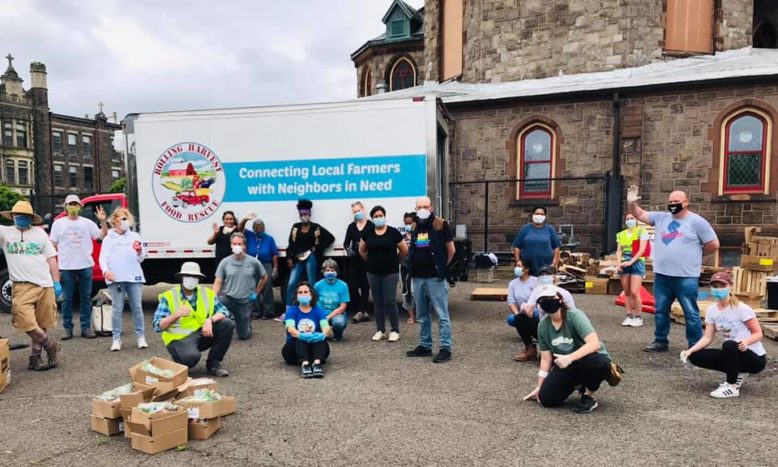
Nearly a year into the Covid-19 pandemic, which has disrupted food systems around the world, the hunger crisis has only intensified. Cathy Snyder, founder of Rolling Harvest Food Rescue, has watched the pressures impact families throughout New Jersey and Pennsylvania. “There is not a single zip code spared,” she says.
Food insecurity and hunger in the United States have existed long before we felt the stress of the coronavirus. In fact, well before we shuttered our doors and sheltered in place last spring, more than 35 million people struggled with hunger in the United States, including 10 million children. In the wake of the pandemic, with job loss at an all-time high, the number of people struggling with food insecurity has grown to more than 54 million people, including 18 million children. “This is unsustainable for us as a country,” says Snyder. “We could do so much better.”
In most cases, the hunger isn’t caused by a shortage of food.“There is a surplus of healthy food right here, it’s just a matter of creating the logistics to get it from where it’s grown to the people who need it and keep it out of landfills,” says Snyder.
Since 2010, Rolling Harvest’s team of more than 200 dedicated volunteers have visited local farms and harvested crops that would otherwise be composted or discarded after the initial commercial harvest. They then distribute this fresh, local produce to food-insecure communities in five counties throughout western New Jersey and eastern Pennsylvania, including food pantries, domestic violence shelters, low-income senior centers, children and family homeless shelters, as well as to at-risk low-income adults with health challenges.“What we have found in doing this for 10 years is that the underlying food system is really stacked against people with limited income,” says Snyder.

Rolling Harvest Food Rescue volunteers. Photo courtesy of Rolling Harvest
Rolling Harvest, headquartered across the Delaware River in New Hope, Pennsylvania, currently works with over 50 farm partners and food producers. But one Garden State farm, in particular, has been with them since the beginning. Gravity Hill Farm in Titusville regularly donates thousands of pounds of food, and has allowed the nonprofit to house their permanent coolers and delivery trucks on their farm.
In late 2020, Gravity Hill Farm and Rolling Harvest announced a new partnership. Gravity Hill Farm will transition to a full-scale farm-based education operation and their available land will be dedicated to growing food specifically for donation. Rolling Harvest will enlist volunteers to come out and help with planting, weeding, and harvesting up to five acres of donation crop that will feed families and recipient sites in need.
The new merger with Gravity Hill Farm will also allow food pantries to come directly to the farm and pick out the exact kind and amount of produce they need, enabling more food banks and pantries to offer fresh, seasonal produce suitable to their guests.
“One of the things we try to do is to show people the respect and the compassion and the dignity that we all need by giving them the choice,” says Snyder. “Not everyone likes okra, not everyone likes Swiss chard. Why not let someone choose for themselves and for their family?” Allowing people to shop for their own food not only provides freedom of choice, but it also helps to significantly reduce food waste.
Snyder and her team also developed an educational nutrition program. At no additional charge to their partner organizations, the program offers on-site tastings and cooking demonstrations that show patrons how to store and prepare seasonal produce. Each demonstration ends with recipe handouts available in both English and Spanish, and all recipes can be found on Rolling Harvest’s website.
For Snyder, a Philadelphia native, advocacy and food justice are inherent to her character. “I was always very active in community service,” she says. “It’s in my DNA.”
Snyder is aware of the discomfort that can be involved with asking for help, but hopes that by turning food banks into farmers’ markets, we can begin to reframe the narrative around food insecurity. “I want people to know that there should be no shame in asking for help. If you’re struggling, if you are having trouble paying your bills and putting healthy food on your table, so are so many of your neighbors,” she says.
For more information about volunteer opportunities or farmers’ markets, visit Rolling Harvest Food Rescue’s website, which also features recipes for the fresh produce that’s distributed.



